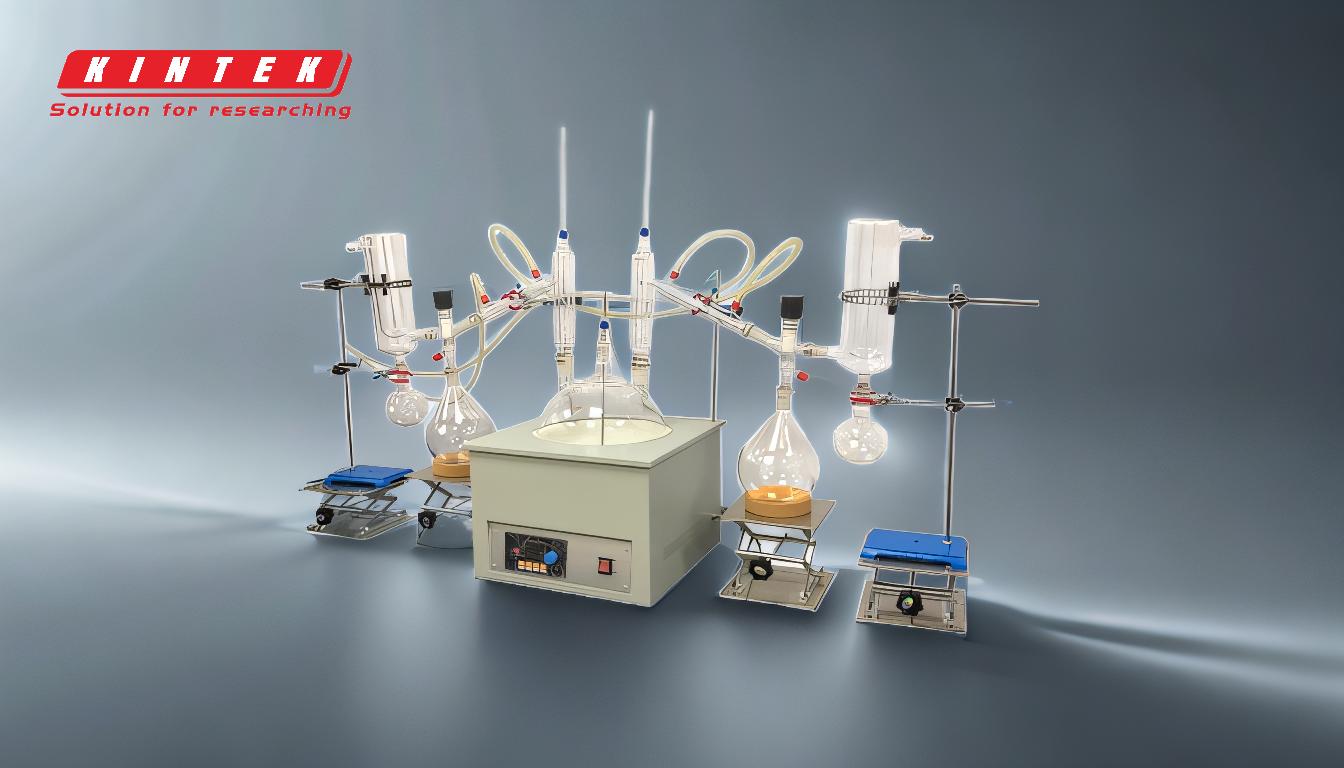Vacuum distillation is a specialized separation process used to purify or isolate components from mixtures that are heat-sensitive or have high boiling points. By reducing the pressure within the distillation apparatus, the boiling points of the components are lowered, preventing thermal decomposition and enabling efficient separation. This method is widely applied in industries such as desalination, chemical manufacturing, pharmaceuticals, and food processing. It is particularly valuable for handling heat-sensitive materials, high-purity requirements, and substances prone to degradation at high temperatures. Applications include desalination, purification of natural and synthetic compounds, solvent removal, and preparation of high-boiling-point materials.
Key Points Explained:

-
Definition and Mechanism of Vacuum Distillation:
- Vacuum distillation is a process where the pressure inside the distillation apparatus is reduced, allowing liquids with high boiling points to boil at lower temperatures.
- This prevents thermal decomposition of heat-sensitive materials, as the components vaporize at temperatures below their normal boiling points.
- The vaporized components are then condensed and collected as high-purity distillates.
-
Primary Applications of Vacuum Distillation:
-
Desalination:
- Used to remove salt from seawater, producing fresh water for industrial and domestic use.
- This is particularly important in regions with limited freshwater resources.
-
Chemical and Pharmaceutical Industries:
- Efficient separation and purification of heat-sensitive or high-boiling-point liquids.
- Ensures high-purity products for use in pharmaceuticals, cosmetics, and chemical synthesis.
-
Food and Natural Product Processing:
- Distillation and concentration of vitamins, oils, and plant extracts.
- Removal of solvents, impurities, and unwanted odors from natural intermediates and derivatives.
-
Desalination:
-
Advantages of Vacuum Distillation:
-
Preservation of Heat-Sensitive Materials:
- Lower operating temperatures prevent degradation of sensitive compounds, such as vitamins, essential oils, and pharmaceuticals.
-
Energy Efficiency:
- Reduced boiling points lead to lower energy consumption compared to traditional distillation methods.
-
High Purity:
- Enables the production of high-purity distillates, essential for industries like pharmaceuticals and fine chemicals.
-
Versatility:
- Applicable to a wide range of materials, including high-boiling-point liquids, heat-sensitive substances, and complex mixtures.
-
Preservation of Heat-Sensitive Materials:
-
Specific Use Cases:
-
Molecular Distillation:
- A specialized form of vacuum distillation used for separating light molecular substances from heat-sensitive materials.
- Applications include deodorization, desolventizing, and removal of monomer phenols.
-
Decolorization and Deodorization:
- Used to improve the quality of natural intermediates, fatty acids, and other derivatives by removing heavy substances and color.
-
Preparation of High-Boiling Materials:
- Suitable for producing high-boiling-point process materials and determining boiling ranges, especially for heat-sensitive substances.
-
Molecular Distillation:
-
Industrial Significance:
- Vacuum distillation is a critical tool in modern industrial processes, enabling cleaner production and optimization of product synthesis.
- It supports the development of high-quality products in industries such as food, medicine, cosmetics, and building materials.
-
Future Trends and Innovations:
- Ongoing advancements in vacuum distillation technology aim to improve efficiency, reduce costs, and expand its applicability to new materials.
- Integration with other separation techniques, such as membrane filtration, is being explored to enhance performance and sustainability.
In summary, vacuum distillation is a versatile and efficient separation technique with broad applications across multiple industries. Its ability to handle heat-sensitive and high-boiling-point materials makes it indispensable for producing high-purity products and optimizing industrial processes.
Summary Table:
| Aspect | Details |
|---|---|
| Definition | Reduces pressure to lower boiling points, preventing thermal decomposition. |
| Applications | Desalination, pharmaceuticals, food processing, and chemical manufacturing. |
| Advantages | Preserves heat-sensitive materials, energy-efficient, high-purity outputs. |
| Use Cases | Molecular distillation, decolorization, preparation of high-boiling materials. |
| Industrial Significance | Essential for producing high-quality products in various industries. |
| Future Trends | Improved efficiency, cost reduction, and integration with other techniques. |
Learn how vacuum distillation can optimize your industrial processes—contact us today!












